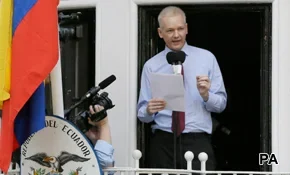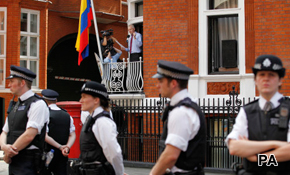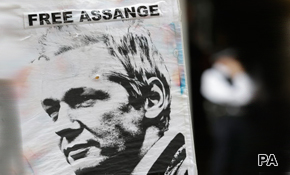Near-on three months have passed since Julian Assange entered Ecuador’s London Embassy in a last-ditch attempt to evade extradition to Sweden to face rape and sexual assault allegations.
In the interim, the Wikileaks founder has been granted political asylum by the South American country; made his first public appearance in months, and become the eye of a storm over whether or not UK police should make use of little-known powers to enter the embassy – and Ecuador’s diplomatic territory in the UK – or wait for Assange to exit before making their arrest.
Ecuador’s decision to protect Assange is unlikely to be anything other than symbolic, however: the UK for one certainly won’t be granting him safe passage to the country anytime soon.
Founded in 2006, Wikileaks shot to prominence for releasing a deluge of confidential and sensitive documents into the public domain, including controversial footage of US soldiers killing 18 Iraqi civilians from a helicopter.
The organisation was also responsible for freeing-up a phenomenal 250,000 US diplomatic ‘cables’, which were published in collaboration with the Guardian and New York Times in 2010.
Sweden has reiterated that it seeks only to put Assange on trial for sexual assault allegations. Yet supporters of Mr Assange claim he could be extradited to a third country to face charges if sent to Sweden.

Over a week ago, Mr Assange made a public appearance from the window of the Ecuadorian Embassy, calling on the United States to “renounce its witch-hunt against Wikileaks.”
In the days after Assange’s statement, we invited you to give your views on the following:
Was Ecuador was right or wrong to allow Mr Assange to stay in its London embassy to avoid extradition?
And should the police use its little-known legal right to enter the embassy and arrest Mr Assange?
Or should they respect the traditional convention that embassies are diplomatic territory, and not enter the building?
We found that…
In line with YouGov’s nationally-representative polling of GB adults’ attitudes, that participants in Labs tended to feel that Ecuador was wrong to shelter Australian-born Assange.
And yet, on the flip-side, that still more of those taking part felt that the UK should up-hold convention, and respect the Ecuadorian embassy as that country’s diplomatic territory – not storm the building to seize Assange.
But how did participants assess the matter?
WHY WRONG TO PROTECT ASSANGE:
Ecuador is needlessly obstructing the course of justice, some participants argued. The country has had no dealings with Assange up to this point, it was also observed, and therefore had no place getting involved in another country’s affairs:
 “None of their business” David S, Shropshire
“None of their business” David S, Shropshire
“They are preventing justice from being carried out in Sweden, Julian Assange may or may not be guilty of these sex assaults but if he is innocent why is he hiding? He should appear in Swedish courts, whether he's involved in a controversial website or not has nothing to do with it!” Emma F, Dundee
“They have no reason to get involved. They are offering protection to a man who could well be a rapist” Anon
The issue is criminal one, not a political one, came the argument. The perception held by some was that Assange’s life was not in danger, nor was he at risk of torture, and has therefore weak grounds for being granted political asylum in the traditional sense:
“The warrant he was running from was clearly criminal, not political. There is no evidence that the USA wants Assange's extradition. In the end, all we have is law and it should be obeyed” Gaius M, S. Yorkshire
“It's not a political issue; it's a criminal law issue in my view. He should face the allegations” Anon
Assange is facing serious allegations, and should stand trial as a test of his innocence, said a number of individuals:
 “Whether he is innocent or guilty, sexual assault is a serious charge, just look at the responses to the crass statements of the American politician. If Assange really wants to fight for truth he needs to be honest and seek to clear his name” Sue, Birmingham
“Whether he is innocent or guilty, sexual assault is a serious charge, just look at the responses to the crass statements of the American politician. If Assange really wants to fight for truth he needs to be honest and seek to clear his name” Sue, Birmingham
“Because of the nature of the allegations against him” Peter, Staffs
“He is wanted in Sweden to face rape charges! Allowing him to stay is giving a message to all would-be murderers and rapists that it is ok to go ahead then seek sanctuary in the Ecuadorian embassy and feed them a hard-lick story” Bryan M, Oxfordshire
Others argued that Sweden was a decent democracy, with a reputable justice system, that Assange could be assured to receive a fair trial under:
“Assange has questions to answer and Sweden is 4th in the world ranking for fairness in its criminal justice system” Anon
“If he is as innocent as he says, Assange should trust one of the countries which is the most liberal, democratic and fair countries in the world to do the right thing. Instead he runs to anywhere but!” Dweeb, East London
WHY RIGHT TO PROTECT ASSANGE:
Over and above, because they believed that the allegations against Assange formed only a small part of a bigger, more complex picture. Most participants said they suspected that Sweden’s desire to charge Assange was in fact a guise for enabling the US to extradite him as an enemy of the state, to put him on trial, and potentially imprison him, for disclosing uncomfortable and incriminating ‘diplomatic’ information:
“To foil any attempt by the USA to extradite him to America” Ian B, Bristol
“To avoid Assange being extradited to a country other than Sweden” Anon
“They're making a stand against US tyranny” Anon
Others felt there were two matters of principle at stake. First, that Wikileaks and Assange are bastions of free speech and information and should be supported and preserved as such. Secondly, what was seen by a few people as an historic right of the individual (concerning politics) to ask for asylum, and of countries to grant it:
“They have shown that they are willing to stand up for the rights of individuals to blow the whistle on corruption and crime” Anon
“Any person who seeks and is granted asylum should be protected regardless. Many truly awful people have done this in the past. JA is only being sought due to the documents leaked” Rik, Midlands
Ecuador’s President, Rafael Correa, notified the press over the bank holiday weekend that the British Foreign Office had given its assurances that UK police would not storm the country’s embassy in Kensington: a move it seems many of our Labs participants will have supported.
But why was it RIGHT for police NOT to broach Ecuador’s diplomatic territory?
The runaway reason? That doing so would set a ‘dangerous precedent’ by breaking international convention, giving countries due cause to storm UK embassies round the world in mirrored circumstances, and inevitably lead to a row with Ecuador:
 “We would want other countries to respect our ambassies and entering this one would create a dangerous precedent” Daisy, Yorkshire
“We would want other countries to respect our ambassies and entering this one would create a dangerous precedent” Daisy, Yorkshire
“It would cause bad relations between Britain and Ecuador. Assange should leave on his own accord” Anon
“If we enter a foreign embassy now, we can expect our embassies abroad to suffer the same fate at some time in the future. Keep to tradition, why is Britain so keen to appease Sweden? Or is the USA trying to pressure us?” Colin D, Glenrothes
“Diplomatic suicide” Gareth, Northants
Others argued that the law mitigating the right of police to cross the embassy threshold to seize the ex-computer hacker did not stretch to Assange, who was not a violent criminal, nor had committed a proven crime worthy of such action:
“The law was not intended for cases like this one. It could cause huge harm to reputation of GB throughout the world” Don, Highlands
“That law was made for terrorism and is irrelevant in this case” Boz, Kendal
“No-one's life is in peril, no national secrets are at risk, no-one will be harmed by Assange being in the embassy” Tony, Southampton
And a smattering of debaters said such an unwarranted, over-the-top reaction would reinforce Assange’s case:
“Entering an embassy is an invasion of a sovereign territory. Assange would love to create such an incident, we should not pander to his ego” David, Cambridge
“To avoid more publicity oxygen for him” Anon
And as for those who thought the police SHOULD exert its legal right:
There was a reprisal of arguments from the first phase of the discussion, with the smattering of participants on this side of the debate arguing that Assange needs to answer to criminal charges, and should not be given preferential treatment:
“That criminal needs to be shown that he can't do whatever he wants and get away with it! It's perfectly reasonable to legally arrest him and send him to Sweden to face charges” GD, Warwickshire
“He cannot hide behind the embassy doors and avoid answering questions” Anon
Otherwise, the police have a duty to uphold the law, by seizing law-breakers – and Assange has broken the conditions of his bail, said a small collection of participants:
“It’s their job to see that criminals are charged” Anon
“Police should follow the letter of the law” Adam, Bedford

What's your view on the topic? Share it below.







